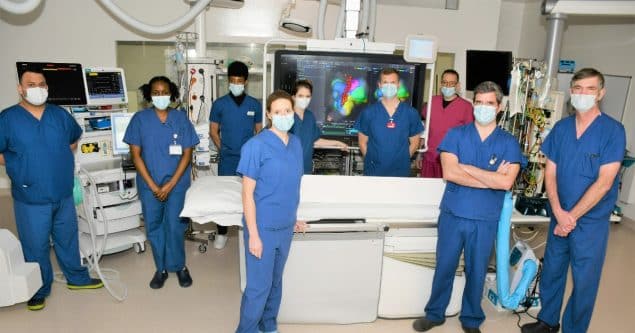Home » UK Employment news » UK government refusing to budge on nurses’ pay as historic strikes loom
UK government refusing to budge on nurses’ pay as historic strikes loom
https://www.whatjobs.com/news/united-kingdom/uk-employment-news/uk-government-refusing-to-budge-on-nurses-pay-as-historic-strikes-loom

By Nagasunder in UK Employment news, posted December 19, 2022

The UK government is "resolute" on its refusal to meet nurses' pay demands as unions threatened more action.
Cabinet minister Oliver Dowden insisted that ministers were "reasonable," but that they had a responsibility to keep government finances under control.
The Royal College of Nursing (RCN) is planning a second strike on Tuesday, December 20.
READ MORE: NHS STAFF SHORTAGES LED TO 30,000 CANCELLED OPERATIONS LAST YEAR
He insisted the government is following guidance from the NHS pay review body deciding on nurses' pay.
This body recommended a £1,400 increase in July, with slightly more for experienced nurses - an increase of about 4 percent on average.
The RCN is calling for a pay rise of 19 percent, but union leader Pat Cullen said this was a "starting point" and any new offer would be put to members.
READ MORE: ASDA TO END BLUE LIGHT CARD DISCOUNT FOR NHS AND EMERGENCY WORKERS
Urging the unions to call off the strike, Mr. Dowden told the BBC's Sunday with Laura Kuenssberg: "We will be resolute to this, because it would be irresponsible to allow public sector pay and inflation to get out of control and we owe a wider duty to the public to make sure we keep our public finances under control."
Challenged about the government's reluctance to engage on pay, the cabinet minister in charge of contingency planning for strikes, said the government was "always willing talk".
He said: "We're trying to be reasonable; we're trying to be proportionate and we're trying to be fair."
READ MORE: NHS NURSES TO STRIKE FOR TWO DAYS BEFORE CHRISTMAS
He added the government was trying to "take the politics out" of the issue of pay by accepting the NHS review body's recommendations.
But Ms. Cullen says ministers are using the recommendations as "cover" and her union was "seriously looking at whether we take part anymore".
"We have been hoodwinked into lending credence to this process for years and if we aren't being listened to then it cannot be independent," she added.
A small number of Conservative MPs have called on the government to revisit its offer to nurses. The latest to do so, former minister Caroline Nokes, called for the government to take "another look at the negotiations".
Some Conservatives, including former cabinet minister Robert Buckland, have also suggested that the pay review body be asked to make new recommendations.
READ MORE: HUNDREDS OF THOUSANDS OF NHS NURSES TO GO ON STRIKE
Mr. Dowden reiterated the government's claim that inflation-matching pay rises across the public sector would cost an additional £28 billion, insisting the figure was "robust," despite criticism from the Institute for Fiscal Studies (IFS), which provided a figure half that.
The Labour-led Welsh government, which is in charge of the NHS in Wales, has also accepted the recommendations of the pay review, stating that it was doing so to protect spending.
On Sunday, First Minister Mark Drakeford stated that the UK government had not provided it with a sufficient budget to cover a higher increase and that funding a raise from its current budget would reduce treatment for patients.
The Northern Ireland power-sharing government would normally negotiate pay, but this is currently on hold due to a political impasse over post-Brexit rules.
READ MORE: NHS NURSE NEARLY SACKED FOR ASKING FOR WEEKENDS OFF TO LOOK AFTER KIDS
The Scottish government has offered NHS workers pay increases averaging 7.5 percent.
Unite and Unison, two major NHS unions representing paramedics, midwives, nurses, and support staff, have agreed to it.
The GMB, on the other hand, has rejected it.
Meanwhile, an RCN ballot in Scotland closes on Monday, Dec 19. It is unclear when the results will be released.
The RCN's strike on Thursday, December 15 was the biggest in its history.
Across England, around 9,999 staff were absent, which meant nearly 16,000 appointments, procedures and surgeries were postponed.
It included around a quarter of hospitals and community teams in England, all trusts in Northern Ireland and all but one health board in Wales.
Ms. Cullen said an increase would contain a greater number of hospitals and grading back support for non-emergency services.
During action so far, the RCN has said it will still control chemotherapy, emergency cancer services, dialysis, critical care units, neonatal and pediatric intensive care.
Need Career Advice? Get employment skills advice at all levels of your career
Some areas of mental health and learning disabilities and autism services are also exempted.
The nurses' strike will be followed on Wednesday, 21 December by an ambulance strike, with Unison, GMB, and Unite members striking on Wednesday, 28 December.
GMB union members will strike again on December 28.
Around 1,200 military personnel have been drafted to cover ambulance workers and striking Border Force personnel.
Military personnel, however, are not "sufficiently trained," according to health unions.
Sara Gorton, head of health at Unison, said there was "unfortunately more risk" to patients during a strike, but said: "Every single day patients are being put at risk because of the staffing crisis".
The Chief of the Defence Staff's words is carefully regulated.
When asked about the strikes, he does not criticize the government for calling in the armed forces, nor those who're taking industrial action.
Source: BBC
Follow us on YouTube, Twitter, LinkedIn, and Facebook.











